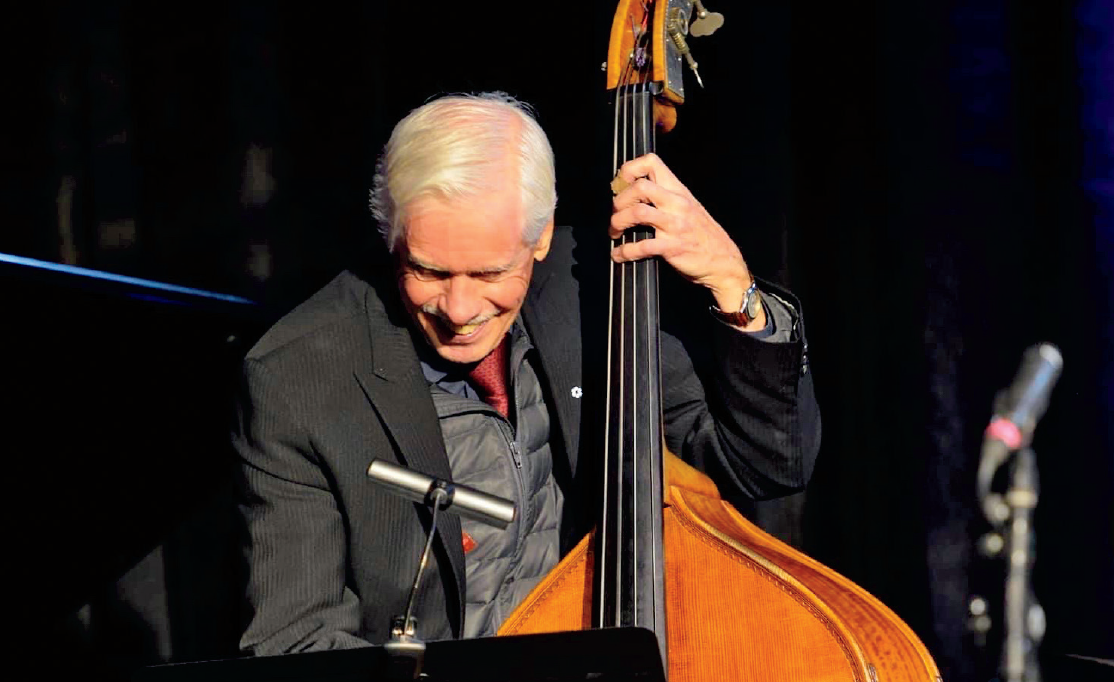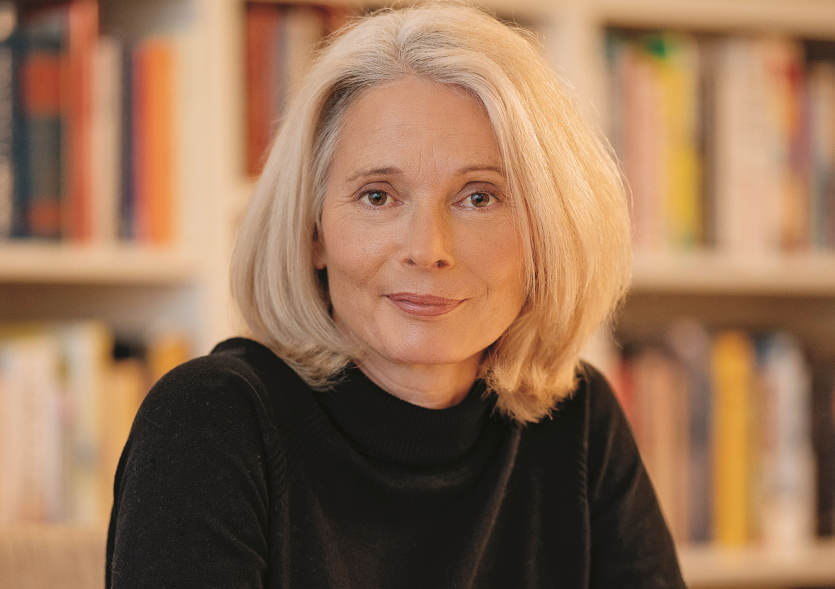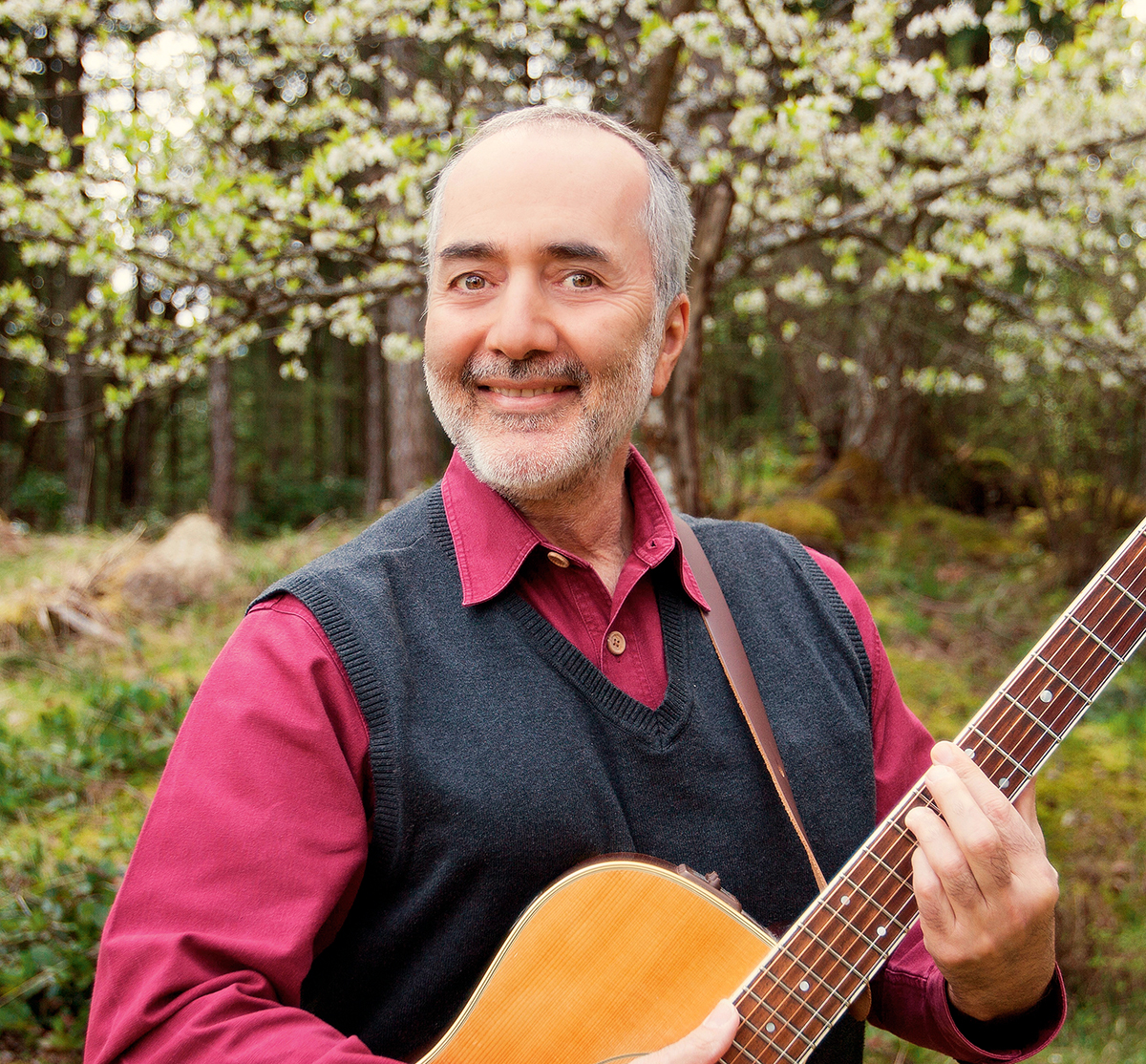The renowned Canadian musician is a master of many styles
By Rob Lutes
Bassist Dave Young is one of Canada’s most celebrated and beloved musicians. Born in Winnipeg and based in Toronto, he played piano, violin, banjo, and guitar before adopting the bass as his primary instrument in the late 1950s. After attending the prestigious Berklee College of Music in Boston in the early 1960s, Young returned to Canada and embarked on a remarkably diverse and distinguished professional career.
Valued for his technical prowess, impeccable sense of time, and sensitive, lyrical playing, Young has worked extensively as an orchestral bassist with the Edmonton Symphony, the Hamilton Philharmonic, and the Winnipeg Symphony. As a jazz artist, he’s collaborated with a who’s who of the genre’s greats, including iconic guitarist Lenny Breau and legendary pianist Oscar Peterson, with whom he enjoyed a 35-year working relationship.
A prolific composer and bandleader, Young is a Juno Award winner and 10-time nominee. A noted educator, he spent three decades as a professor at the University of Toronto and has mentored many of Canada’s finest bassists. For his contributions to the world of music, Young was named a Member of the Order of Canada in 2006. He and his wife divide their time between Toronto and their farm near Cobourg, Ont.
You were raised in Winnipeg. Was yours a musical family?
Yes. My mother was a pianist and an artist. And my sister was a pianist who studied at Juilliard. She’s 87 years old and still teaching in Winnipeg. Amazing.
What was your first instrument?
I tinkered around with the piano, but I had an affinity for stringed instruments. So I started playing the guitar and the banjo. Then I took up the violin in a serious way. From there, I became more interested in guitar and bass and pop music and jazz.
You were a teen in the ’50s, an exciting time in music.
Absolutely. At one point, I had a band doing Elvis Presley covers. I guess I was 15 or 16. We would go out on weekends and play opposite some pretty experienced groups, but because it was Elvis, we always got a lot of the attention.
Had you already decided that music was going to be your profession?
No, I was just getting experience playing all kinds of music. One of my favourite genres was rural blues. I used to listen every night to a station in Little Rock, Arkansas, and they would play nothing but blues—you know, Muddy Waters and Little Walter. I became very familiar with that kind of music, and that became the basis for my initial jazz playing. And because I seemed to know what I was doing, I got the chance to play bass with a lot of good players who came through town. The odd time they were blues players. Sonny Terry and Brownie McGee came to town and said: “Oh, let’s get this guy Dave. He knows what he’s doing.” And I learned to really listen. I was playing and thinking about music a lot.
I flunked out of architecture at the University of Manitoba, and I thought, “Okay, you should take a bit of time off and do what you really want to do.” I decided to go to Boston to attend Berklee. My dad was very supportive of that, considering he was an accountant. That was exceptional. He drove me to the bus depot with my bass and said: “Have a nice year. Bye.”
How was Berklee?
I stayed for only one year, but it was great because I played and recorded with many great young musicians, some of whom subsequently became quite famous—guys like Tony Williams and Gary Burton. I was living in a $10-a-week room, eating out all the time, and making spending money playing gigs. I thought, “This is great, but I want to get some more education so I don’t have to do this because there’s nothing else.” I went back to the University of Manitoba and ended up graduating with a B.A. in economics and mathematics and then a degree in business administration.
You were playing a lot of music?
Yeah. I started working with a lot of good players. Lenny Breau was one of the guys who was in Winnipeg at that time. We played together a lot, doing TV shows and radio shows. And there were many other fine guitar players in Winnipeg. There was Jim Pirie. And there was Ron Halldorson, who still lives there and plays. And there was a pianist, Bob Erlendson, who was a teacher to all of us. He taught Lenny all the tricks of the trade.
You were playing a range of genres?
Yes, not all jazz. I played in musical theatre and did a lot of TV work; I later joined the Winnipeg Symphony. So my reading and being familiar with different styles was important.
You moved to Toronto in 1967. Why?
I wanted to get into a bigger city where I would have a better chance of making a living. I studied orchestral bass with Tom Monahan, principal bassist with the Toronto Symphony, for three years. I would spend six hours a day practising classical music and then play jazz in the clubs at night. After that, I played a couple of years with the Edmonton Symphony, and then I played with the Hamilton Philharmonic. I was also playing with the National Ballet of Canada and the Canadian Opera Company. And, of course, I was playing jazz.
You maintained a high level in many types of music.
I like a challenge. I like being able to play in a blues format, in a theatre setting, in the orchestra. And I like being able to improvise in a jazz group. And rock ’n’ roll isn’t bad either.
How did your relationship with Oscar Peterson begin?
I met Oscar in 1974 at the Banff Centre. We played a concert as the final part of a week-long clinic. Then his office called me and said, “Mr. Peterson wants to know if you’d like to join his group.” I took the gig and quit the Winnipeg Symphony, where I had just started as principal bassist. Then I said, “Okay, who’s in the band, and when do we start rehearsing?” They said, “Well, the band is you and Oscar.” It was a duo for six months.
What was it like playing with the greatest jazz pianist on the planet?
That was the biggest challenge of my musical life. You have to learn all his stuff by memory. You don’t walk out with a music stand. Plus, playing just two of you in a hall that holds three to four thousand people night after night, you have to have your stuff together. There’s no set list. He starts playing and you have to figure out right away what it is and fall in. So you have to learn the arrangements. A lot of times I would write out the bass part and memorize it.
Touring with Oscar was something special?
Well, let me put it in perspective. The first three weeks, we’re in Japan. When we arrive, we get off the plane and walk down the steps onto the tarmac and all of a sudden there’s a red carpet stretching about 300 yards to the terminal. I said, “Hey, Oscar, what’s this?” He said, “This is for us.” He was getting the royal treatment. At first, I was a little bit nervous. You don’t walk out on that stage feeling like, “Yeah, I’ll have fun.” No. You walk out there with the expectation that you better get this right.
Did you like touring?
I liked it, but the whole travel thing, after a while, starts to get you down. Airports, hotels, airports, hotels. And you know, I had to tour with my bands as well—I had to go back in the van. Otherwise, you don’t get a chance to play your own stuff. I’ve got a big library of different styles of music and different players I’ve toured with.
Were you and Oscar friends?
Absolutely. Good friends. I spent a lot of time with O.P. sitting around the kitchen table, just talking about music and laughing. He was a great guy, very knowledgeable about all kinds of things, very well read.
Were other musicians in awe of him?
Everybody was on their best behaviour when he was in the club. If you were playing and somebody said, “Hey, Oscar just walked in,” the band would immediately start playing better.
You’ve played with many jazz greats over the years. What’s that like?
It certainly makes playing a lot easier when you’re with guys like Kenny Burrell and Barney Kessel. You know when you go to the gig that it’s going to be good. On the other hand, you also know that you should know the repertoire that they expect, so you’ve got to check out the recordings.
And you’re 82 and still gigging.
Yes, it’s like the pianist Cedar Walton said towards the end of his life. His wife, Martha, said, “Cedar, you should stop doing all this, going to Japan and Europe.” He said, “But, Martha, this is what I do.” That was the end of the conversation. This is what I do. Among other things—I also like to go to the farm and fix fences and just forget about music. But music is really what I do.
You’ve also done a lot of teaching.
Yes. I was at the U of T for many years. It kept me in touch with the younger generations, what they were motivated by and interested in.
As a jazz player, how important was it to teach students to play by ear?
I wouldn’t say that it was the main thing, but playing by ear is really important in improvising music. It’s one thing to sit and play a piece of music that somebody wrote; you have to be disciplined and play it as written. But for jazz, you have to really develop your ear.
When you think of your life, what has music meant to you?
Music has allowed me to meet all kinds of interesting people and to travel all over the world. And the act of performing music has given me a great deal of pleasure. I feel that this is why we’re put here on this earth—to communicate and bring joy to people.
And what about amateur musicians or those who are thinking about taking up music, even later in life? Do you think they can experience that kind of pleasure?
Absolutely! Music is a connection point. And you can experience that just by singing in a choir or playing an instrument with your friends. It doesn’t have to be at a particular level. You’ll get the same sense of accomplishment and pleasure just by doing it.






